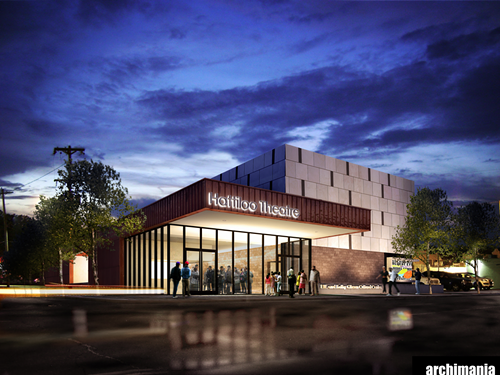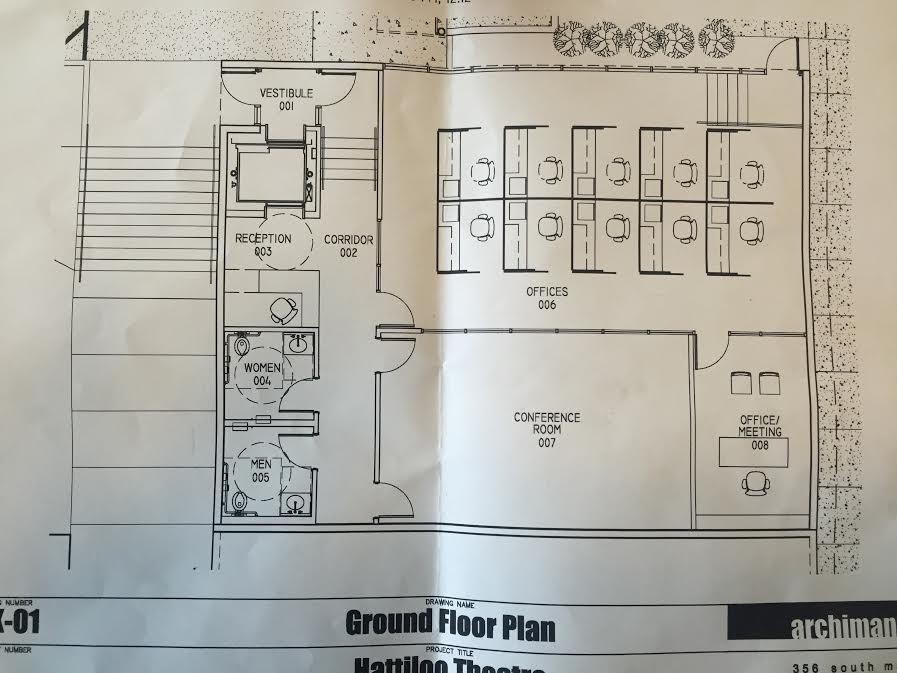
The Hattiloo Theatre has come great distance in only 10 years. Ekundayo Bandele’s black repertory theater launched in 2006 in a cramped but lovingly converted storefront on Marshall Avenue just north of Sun Studio. Eight years later, following an innovative capital campaign, Bandele moved his company into a new, custom-built playhouse on Overton Square. Now, only 18 months — and not quite two full performance seasons — after the big move, Bandele and his board of directors are preparing to undertake the Hattiloo’s first major expansion.
Longtime board member Cardell Orrin says the need to expand physical resources became apparent during a strategic planning effort. “We thought about our mission and the kind of staffing we’d need to meet these goals,” he says. “And it became clear that we were already bursting at the seams in terms of multiple plays on stage, multiple plays in rehearsal, and everything else.”

$750,000 in funding is already in place, and plans have been developed to build a two-story, 3,200 square-foot Development Center just off the northwest corner of the existing theater building at 37 S. Cooper at Monroe. “We’re calling it the D.C.,” Bandele says. The list of contributing benefactors for the expansion is only four names long: An anonymous Friend of the Hattiloo Theatre, The Assisi Foundation, The Hyde Family Foundation, and The City of Memphis.
“Of course the first question we had to answer was why so quick?” Bandele says. “That answer was simple. The new building generated a level of growth — or more accurately a pace of growth — that we weren’t prepared for. “We’ve always done a lot, but we’ve done it with so little,” Bandele explains. “We had to make compromises.”
The Hattiloo has never been a playhouse only. It has doubled as a teaching space, cultural center, and hub for artists. Since its move to Midtown, the theater has hosted everything from book clubs to film festivals to conversations about social justice. Orrin describes the Hattiloo as “This dream of what Memphis could and should look like.”
Ambitious programming found the rapidly growing company with one play open and running on its main stage, a second play in technical rehearsals in the adjoining black box theater, a youth program rehearsing in the lobby, and no space available for anything else. To accommodate all the activity many rehearsals moved off site to Rhodes College or the Urban League on Union Avenue. “The real problem with all these locations is that a parent takes their kids to a rehearsal at the Urban League one night, then to Rhodes the next night, then Hattiloo,” Bandele says. “There’s been no consistency. So whenever we were rehearsing or doing programs, it was a full-time job just figuring out where things are being placed. Now everything we do is going to be on the same campus.”

Like the Hattiloo, the D.C. is being designed by Barry Yoakum and the design team at Archimania. The new space will be divided equally into two 1,600 square-foot stories. There are 10 small office spaces, a modest conference/rehearsal room, and a smaller office/meeting room on the first floor. The second floor is dedicated primarily to the development center — a large open room with an adjoining lobby and green room. Although it is laid out like a third performance space the D.C. won’t be used as a venue for additional programming. “I mean, where would we rehearse then?” Bandele asks. “We might do an occasional showcase there or something like that but nothing else. That would defeat the whole point.”
“Archimania has done a fantastic job of building a lot into a small space,” says Orrin. “They figured out how to grow it from one to two stories and put in an elevator.”
Bandele sees the new building as both a solution to his growth problems and as a chance to create more opportunities for theater education and community engagement. “We are definitely going to amp up our youth theater program,” he says. He also anticipates growing a program the Hattilooo started for young adults with special needs.
Oluremi (Loo), Bandele’s youngest daughter, has cerebral palsy. “I noticed that, as soon as a young person with special needs graduates from high school, their entire social circle just collapses,” he says. “So not only will this allow young adults with special needs to continue to have a social life, it helps in the same ways theater helps everybody. It’s going to help with speech, with the expression of emotion, and with their bodies.”
There are also plans to relaunch the Hattiloo Theater School for adults, which focuses on playwriting, directing, and acting.
If all goes according to plan, construction on the Hattiloo’s Development Center should begin before the end of the first quarter and be complete before the end of 2016.